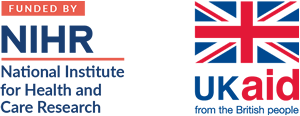
Introduction
Malaria is one of the greatest public health challenges facing countries in West Africa. It is responsible for hundreds of thousands of deaths every year and disproportionately affects children in this region of the world. By better understanding the genomic landscape of malaria parasites and vectors in this region, National Malaria Control Programs (NMCPs) can better tailor their responses and save lives. This project will establish the scientific, technical, and operational infrastructure for regional genomic surveillance hubs in West Africa.
Objectives & Coordination
With support from the UK’s National Institutes of Health Research (NIHR), the idea is to build on existing genomics expertise in The Gambia and Ghana to establish hubs where samples from countries across the region can be sequenced. By collecting, sequencing, and analysing samples locally, NMCPs can access more timely data on drug and insecticide resistance and make more informed policy decisions. The first-choice technology for this project is amplicon sequencing, and partners will be implementing local versions of the MalariaGEN Amplicon Toolkit. This will be able to provide information on drug resistance in the parasite P. falciparum. There are also plans to implement other genomic assays that can identify insecticide resistance, vector species diversity, diagnostic test failures, and overall epidemiology of malaria in the region. This research was funded by the NIHR (NIHR134717) using UK aid from the UK Government to support global health research. The views expressed in this publication are those of the author(s) and not necessarily those of the NIHR or the UK government.

Our partners
In the early phases two networks of scientists, clinicians and public health teams have helped refine SpotMalaria. We have expanded our scope and while still working closely with these networks, we now have partners and collaborations from 24 different countries in Asia, Africa, and South America.
GenRe-Mekong
 GenRe-Mekong is funded by the Bill & Melinda Gates Foundation to support malaria elimination efforts in the Greater Mekong Subregion(link is external), which straddles regions of Cambodia, Vietnam, Laos, Thailand, and South China. The GenRe-Mekong project aims to supply strategically important information from genetic data to national control programmes and other elimination projects, in the most easily implementable, timely, comprehensive and cost-effective manner possible.
GenRe-Mekong is funded by the Bill & Melinda Gates Foundation to support malaria elimination efforts in the Greater Mekong Subregion(link is external), which straddles regions of Cambodia, Vietnam, Laos, Thailand, and South China. The GenRe-Mekong project aims to supply strategically important information from genetic data to national control programmes and other elimination projects, in the most easily implementable, timely, comprehensive and cost-effective manner possible.
Pathogens genomic Diversity Network Africa (PDNA)
The prospect of malaria elimination in Africa presents unique challenges. Malaria is more common and acquired immunity can mean that drug pressure is lower, in addition to the non-biological factors, for example social and political factors, that can affect transmission dynamics. While drug resistance is a large problem, there is also a need to determine how parasite genetics both influence and are influenced by these differences across African populations. To answer these questions, we’re partnering with researchers from the PDNA to establish important baseline genetic data across as many populations as possible.
Ghansah et al. Monitoring parasite diversity for malaria elimination in sub-Saharan Africa. Science, 2014; 345(6202): 1297-8. DOI: 10.1126/science.1259423(link is external).
Read more about the PDNA(link is external).
Pilot phase
The Pf3k project will have several discrete phases, beginning with a pilot phase which commenced in June 2014. During the pilot phase, the Project is analysing Illumina short-read sequence data on 2,512 samples from multiple locations in Africa and Asia, together with laboratory samples for benchmarking and methods development. The MalariaGEN P. falciparum Community Project and the Broad Institute, together with their partners, have contributed the samples for the pilot phase. The Project will generate genotype calls by a range of different methods, and will perform methodological comparisons and performance metrics.
Planned analyses
During the pilot phase, the Project is undertaking a series of planned analyses that will form the basis of a manuscript, ‘A global reference for genomic variation in Plasmodium falciparum‘, using Pilot Phase data (2,512 samples).
- Sequence data and quality including SNPs, short tandem repeats, haplotypes and patterns of linkage disequilibrium
- Population genetic phenomena such as population comparisons, mutation and recombination rates (haplotype structure and LD)
- Signals of selection and demographic analyses
- Merozoite surface proteins
- var genes and genes implicated in drug resistance
Removing Pf3k Pilot Phase Terms of Use
The Pf3K Pilot Phase Terms of Use were applied to Pilot Phase data releases when they were publically released. In September 2016 these restrictions have been lifted from Pf3k pilot data release packages 1-5 and the data are available open access.
Genetic Report Cards
We use ‘Genetic Report Cards‘ to provide information on genetic variation relevant to drug resistance for each sample. Currently, we report on genetic variations that are relevant to resistance to several antimalarial drugs:
- artemisinin (kelch13, arps10, mdr2, fd, crt genes)
- piperaquine (plasmepsin2-3, exo)
- chloroquine, amodiaquine, mefloquine (crt, mdr1)
- sulfadoxine, pyrimethamine (dhfr, dhps)
In addition, we report on other genetic variations relevant to parasite epidemiology:
- Detection of additional species of Plasmodium in a P. falciparum infection, such as P. vivax, P. knowlesi, P. malariae, P. ovale
- Genetic barcodes (101 high-diversity SNPs across the genome), used to estimate complexity of infection (COI), identify expanding strains and reconstruct the geographic origins of samples.
GenRe-Mekong is funded by the Bill & Melinda Gates Foundation.
Locations

Sampling locations
Albania (AL), Algeria (DZ), Angola (AO).
Data
Data generated by the P. falciparum Genetic Crosses project is made available open access.
Current
2261 whole genome sequences from mosquito samples collected in Burkina Faso, Gabon, Nigeria, and Uganda.
Allele frequencies, Genotype dataThis data is subject to
Anopheles gambiae Genomic Surveillance Project Terms of Use
Host-parasite interaction using over 4,000 DNA samples from children confirmed to have severe malaria in the period 1995-2009 to test for association between human and P.falciparum genetic variants.
Open access
Sample information for 20,864 samples from 33 countries
Sample metadata, SNPsOpen access
Sample set: Parents and 78 progeny clones from three crosses (3D7xHB3, HB3xDd2 and 7G8xGB4)
Sequence data and variant calls
Allele frequencies, Analysis BAMsApply for access to
P. falciparum Community Project Terms of Use
Archived
Training
We are currently working together with the Pan-African Mosquito Control Association (PAMCA) to deliver the second edition of the online training course in data analysis for genomic surveillance of African malaria vectors(link is external). This free course will run for 8 weeks with whole-day workshops every Wednesday from June 7th to July 26th, 2023.
Acknowledgements
For partners that have publications using data produced by the project we ask that the following statement is included in the acknowledgements.
This publication uses data from the MalariaGEN SpotMalaria project as described in ‘Jacob CG et al.; Genetic surveillance in the Greater Mekong Subregion and South Asia to support malaria control and elimination; eLife 2021;10:e62997 DOI: 10.7554/eLife.62997‘. The project is coordinated by the MalariaGEN Resource Centre with funding from Wellcome (206194, 090770). The authors would like to thank the staff of Wellcome Sanger Institute Sample Management, Genotyping, Sequencing and Informatics teams for their contribution.
Partner studies
The project is divided into four separate studies, according to P. falciparum parasite data, P. vivax parasite data, vector data and human data.
We seek to address a scientific question on effects of season and vector control interventions on population genetics of Anopheles funestus and Anopheles gambiae malaria vectors in Zambia. Specimens will be collected from Nchelenge, Ndola and Choma Districts…
15,036 specimens
from
26 countries
People
Project leadsThe hubs will be located at The Medical Research Council Unit The Gambia at the London School of Hygiene & Tropical Medicine and the University of Ghana (West African Centre for Cell Biology of Infectious Pathogens (WACCBIP))
Documents
News & blogs
- Blog 11 Oct 2023
- News 25 Sep 2023
Funding support
- Design and implementation of multiplexed amplicon sequencing panels to serve genomic epidemiology of infectious disease: A malaria case study
LaVerriere E et al.Molecular Ecology Resources, 2022; 22 2285
Project contacts
Updates
Partner data release (v7.0)
Plasmodium falciparum Community Project data, version 7.0 is now available. This release includes over 10.1 million SNPs based on an analysis of 20,864 samples from 54 partner studies in 33 countries. Details of the release are included in MalariaGEN et al, Wellcome Open Research 2023, 8:22 https://wellcomeopenresearch.org/articles/8-22
Partner data release (v6.0)
Plasmodium falciparum Community Project data, version 6.0 is now available. This release includes over 9.1 million SNPs based on an analysis of 20,864 samples from 54 partner studies in 33 countries. Details of the release are included in MalariaGEN et al, Wellcome Open Research 2023, 8:22 https://wellcomeopenresearch.org/articles/8-22